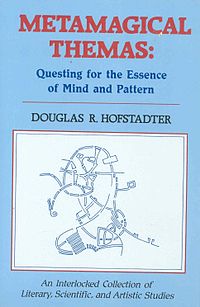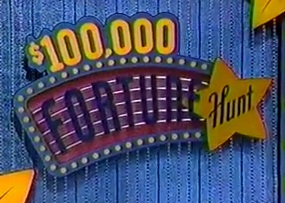Related Research Articles

Douglas Richard Hofstadter is an American scholar of cognitive science, physics, and comparative literature whose research includes concepts such as the sense of self in relation to the external world, consciousness, analogy-making, artistic creation, literary translation, and discovery in mathematics and physics. His 1979 book Gödel, Escher, Bach: An Eternal Golden Braid won both the Pulitzer Prize for general nonfiction and a National Book Award for Science. His 2007 book I Am a Strange Loop won the Los Angeles Times Book Prize for Science and Technology.

Martin Gardner was an American popular mathematics and popular science writer with interests also encompassing scientific skepticism, micromagic, philosophy, religion, and literature – especially the writings of Lewis Carroll, L. Frank Baum, and G. K. Chesterton. He was also a leading authority on Lewis Carroll. The Annotated Alice, which incorporated the text of Carroll's two Alice books, was his most successful work and sold over a million copies. He had a lifelong interest in magic and illusion and in 1999, MAGIC magazine named him as one of the "100 Most Influential Magicians of the Twentieth Century". He was considered the doyen of American puzzlers. He was a prolific and versatile author, publishing more than 100 books.
Nomic is a game created in 1982 by philosopher Peter Suber, the rules of which include mechanisms for changing those rules, usually beginning by way of democratic voting. The game demonstrates that in any system where rule changes are possible, a situation may arise in which the resulting laws are contradictory or insufficient to determine what is in fact legal.
Recreational mathematics is mathematics carried out for recreation (entertainment) rather than as a strictly research- and application-based professional activity or as a part of a student's formal education. Although it is not necessarily limited to being an endeavor for amateurs, many topics in this field require no knowledge of advanced mathematics. Recreational mathematics involves mathematical puzzles and games, often appealing to children and untrained adults and inspiring their further study of the subject.

Self-reference is a concept that involves referring to oneself or one's own attributes, characteristics, or actions. It can occur in language, logic, mathematics, philosophy, and other fields.

The Evolution of Cooperation is a 1984 book written by political scientist Robert Axelrod that expands upon a paper of the same name written by Axelrod and evolutionary biologist W.D. Hamilton. The article's summary addresses the issue in terms of "cooperation in organisms, whether bacteria or primates".
A strange loop is a cyclic structure that goes through several levels in a hierarchical system. It arises when, by moving only upwards or downwards through the system, one finds oneself back where one started. Strange loops may involve self-reference and paradox. The concept of a strange loop was proposed and extensively discussed by Douglas Hofstadter in Gödel, Escher, Bach, and is further elaborated in Hofstadter's book I Am a Strange Loop, published in 2007.

Gödel, Escher, Bach: an Eternal Golden Braid, also known as GEB, is a 1979 book by Douglas Hofstadter. By exploring common themes in the lives and works of logician Kurt Gödel, artist M. C. Escher, and composer Johann Sebastian Bach, the book expounds concepts fundamental to mathematics, symmetry, and intelligence. Through short stories, illustrations, and analysis, the book discusses how systems can acquire meaningful context despite being made of "meaningless" elements. It also discusses self-reference and formal rules, isomorphism, what it means to communicate, how knowledge can be represented and stored, the methods and limitations of symbolic representation, and even the fundamental notion of "meaning" itself.

Metamagical Themas is an eclectic collection of articles that Douglas Hofstadter wrote for the popular science magazine Scientific American during the early 1980s. The anthology was published in 1985 by Basic Books.
Skeptical Inquirer is a bimonthly American general-audience magazine published by the Committee for Skeptical Inquiry (CSI) with the subtitle: The Magazine for Science and Reason.
In economics and game theory, a participant is considered to have superrationality if they have perfect rationality but assume that all other players are superrational too and that a superrational individual will always come up with the same strategy as any other superrational thinker when facing the same problem. Applying this definition, a superrational player playing against a superrational opponent in a prisoner's dilemma will cooperate while a rationally self-interested player would defect.

Self-referential humor, also known as self-reflexive humor, self-aware humor, or meta humor, is a type of comedic expression that—either directed toward some other subject, or openly directed toward itself—is self-referential in some way, intentionally alluding to the very person who is expressing the humor in a comedic fashion, or to some specific aspect of that same comedic expression. Self-referential humor expressed discreetly and surrealistically is a form of bathos. In general, self-referential humor often uses hypocrisy, oxymoron, or paradox to create a contradictory or otherwise absurd situation that is humorous to the audience.

Blinkenlights is a neologism for diagnostic lights usually on the front panels of old mainframe computers, minicomputers, many early microcomputers, and modern network hardware. It has been seen as a skeuomorph on many modern office machines, most notably on photocopiers.

A sweepstake is a type of contest where a prize or prizes may be awarded to a winner or winners. Sweepstakes began as a form of lottery that were tied to products sold. In response, the FCC and FTC refined U.S. broadcasting laws. Under these laws sweepstakes became strictly "No purchase necessary to enter or win" and "A purchase will not increase your chances of winning", especially since many sweepstakes companies skirted the law by stating only "no purchase necessary to enter", removing the consideration to stop abuse of sweepstakes. Today, sweepstakes in the United States are used as marketing promotions to reward existing consumers and to draw attention to a product. By definition, the winner is determined by pure random chance rather than skill.
A sequence of six consecutive nines occurs in the decimal representation of the number pi, starting at the 762nd decimal place. It has become famous because of the mathematical coincidence, and because of the idea that one could memorize the digits of π up to that point, and then suggest that π is rational. The earliest known mention of this idea occurs in Douglas Hofstadter's 1985 book Metamagical Themas, where Hofstadter states
I myself once learned 380 digits of π, when I was a crazy high-school kid. My never-attained ambition was to reach the spot, 762 digits out in the decimal expansion, where it goes "999999", so that I could recite it out loud, come to those six 9's, and then impishly say, "and so on!"
Nicolas Hammond is a British Rubik's Cube expert and businessman. He has lived in the US since 1986. He made the world's first Internet banking transaction.

100,000 Fortune Hunt is an American lottery-based game show originating in the state of Illinois. It debuted on September 16, 1989, and aired on Saturday evenings from 1989 to 1994 on WGN-TV in Chicago ; it was also broadcast on WGN's national satellite feed. Jeff Coopwood hosted the first season, with the rest of the run being hosted by Mike Jackson. Linda Kollmeyer served as the hostess during the entire run with Bill Barber as the announcer.
Platonia may refer to:

Jean-Pierre Eckmann is a Swiss mathematical physicist in the department of theoretical physics at the University of Geneva and a pioneer of chaos theory and social network analysis.
References
- ↑ Hofstadter, Douglas (June 1983). "Dilemmas for Superrational Thinkers, Leading Up to a Luring Lottery". Scientific American . 248 (6). – reprinted in: Hofstadter, Douglas (1985). Metamagical Themas . Basic Books. pp. 737–755. ISBN 0-465-04566-9.
- ↑ Hofstadter, Douglas (September 1983). "Irrationality Is the Square Root of All Evil". Scientific American . 249 (3). – reprinted in: Hofstadter, Douglas (1985). Metamagical Themas . Basic Books. pp. 756–766. ISBN 0-465-04566-9.
